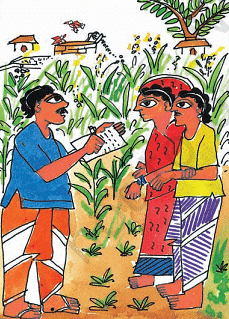Rural Administration Summary Class 6 Social Science Chapter 5
Introduction
India comprises more than six lakh villages, each posing unique challenges in providing essential services like water, electricity, and road connections. This chapter delves into the intricate responsibilities of rural administrative officers, with a focus on the experiences of individuals like Mohan and the role of the police and Patwari in resolving disputes.
A Quarrel in the Village
Mohan's Dilemma
Mohan, a farmer, faced a land dispute with Raghu, which escalated into a physical altercation. Raghu's influential background added complexity to the situation, forcing Mohan to navigate the challenging decision of reporting the incident to the police or not. The community's differing opinions further compounded the dilemma.
Police Station Dynamics
Upon reaching the local police station, Mohan encountered resistance from the Station House Officer (S.H.O), who initially dismissed his complaint. This section explores the dynamics within a police station, emphasizing the importance of community support in ensuring justice.
Area of the Police Station
- Every police station has a designated area of control.
- Mohan's choice to report the incident to his local station is explored, highlighting the geographical constraints that determine where a case can be registered.
- This section engages students in critical thinking about police station jurisdiction.
Maintenance of Land Records : Patwari's Role
The Patwari, responsible for maintaining land records, is introduced. The narrative explores how the Patwari uses maps and registers to resolve land disputes. The significance of regularly updating records is underscored.
The Work at the Police Station
Government Hierarchy
- This section introduces the hierarchy within the revenue department, emphasizing the role of the Tehsildar in overseeing the Patwari's work.
- The Tehsildar's office becomes a focal point for land dispute resolution.
Gender Equality in Land Ownership
- The Hindu Succession Amendment Act, 2005, is explained, emphasizing the transformative impact on women's land ownership rights.
- A hypothetical scenario illustrates how this law benefits daughters like Sudha.
|
295 videos|1066 docs|204 tests
|
FAQs on Rural Administration Summary Class 6 Social Science Chapter 5
| 1. What is the importance of rural administration? |  |
| 2. What are the key responsibilities of the police station in a village? |  |
| 3. How does a police station handle disputes in a village? |  |
| 4. What is the significance of effective communication in rural administration? |  |
| 5. How does rural administration contribute to the overall development of a village? |  |























